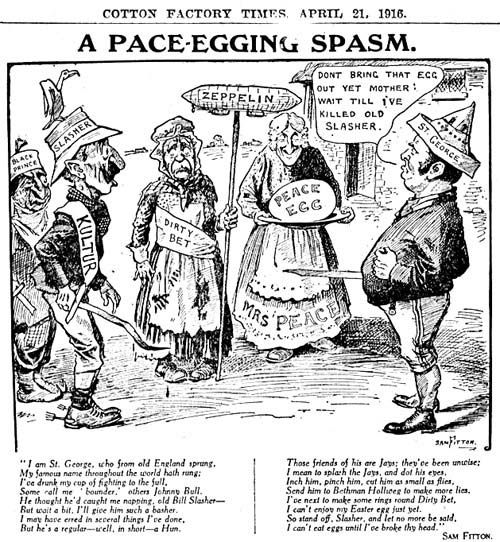Todmorden Weavers and the Great War.
Tuesday, 19 February 2013
At a time when cotton was king, the Todmorden Weavers’ association, the premier trades union in the Upper Calder Valley, was about to face the turmoil of the Great War.
Alan Fowler, former lecturer in Economic and Social History at Manchester Metropolitan University, told a meeting of the Hebden Bridge Local History Society that membership in Todmorden and Hebden Bridge reached more than 4000 at its peak.
Unlike in other industries, women, who made up the majority of weavers, were paid equally with men, and the union leaders were selected by examination to ensure they could work out the complicated piece work rates. In May 1914, the prestigious Weavers’ Institute on Burnley Road was opened amid great celebration, reflecting the status of the union on the brink of the first world war.
During the early part of the war when exports of cotton cloth were hit, the weavers were forced to work ‘short time’ and suffer the consequent loss of earnings. Then, as the war progressed, men, driven by lack of work as well as patriotic fervour, went away to the front as volunteers, leaving the industry seriously short of labour. This was made worse once conscription was introduced in 1916, and late in 1917 after America joined the war there was also a severe shortage of raw cotton.

These events were made vivid through a collection of remarkable cartoons. Sam Fitton, a weaver, music hall artiste, dialect poet and cartoonist, contributed his powerful cartoons to the Cotton Factory Times throughout this period. They capture the mood of the times, depicting the fight against conscription and upper class trickery as well as to save the greatly weakened king cotton. Alan has curated an exhibition of these cartoons at the People’s History Museum in Manchester.
At the next meeting of the Hebden Bridge Local History Society, on Wednesday 27th February Kai Roberts will be exploring the mysteries surrounding the final resting place of Robin Hood.
Previously, on the HebWeb
Our Railway Station in the 19th century. David Taylor told a meeting of the Local History Society about how the early railway developed in Hebden Bridge. Read more (28 Jan)
Untold Stories: A glimpse into the lives of local people - Tony Wright has for the past ten years been collecting personal life stories on film and audio tape. Read more (18 Jan)
City in the Hills - Corinne McDonald and Ann Kilbey told a meeting of the Local History Society of Dawson City, the building of the Walshaw Dean Reservoirs and the publication of a new book. Read more (16 Dec)
Lament for the Mills - Robert Cockcroft, poet and academic told of his childhood spent close to mills owned and operated by his grandfather, John Cockcroft and his father, Keith. Read more (2 Dec)
How much thought do you give to a war memorial? - Mike Edwards told a meeting of the Local History Society, war memorials can be found in many forms and in unusual places. Read more (17 Nov)
Clubhouses: self help and co-operation - A small row of houses in Old Town, called Clubhouses, encapsulates some of the history and spirit of the Calder Valley explains Julie Cockburn. (30 October 2012)
Small Town Saturday Night - The story of a love affair with rock 'n roll at its peak in the 1950s and 60s from speaker Trevor Simpson.
The world of Cornelius Ashworth, speaker Alan Petford, Local History talk of 10 October 2012

